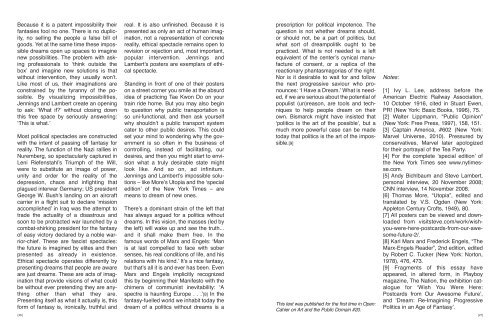Download pdf version of issue no. 16 (4 Mb) - Pavilion
Download pdf version of issue no. 16 (4 Mb) - Pavilion
Download pdf version of issue no. 16 (4 Mb) - Pavilion
Create successful ePaper yourself
Turn your PDF publications into a flip-book with our unique Google optimized e-Paper software.
Because it is a patent impossibility their<br />
fantasies fool <strong>no</strong> one. There is <strong>no</strong> duplicity,<br />
<strong>no</strong> selling the people a false bill <strong>of</strong><br />
goods. Yet at the same time these impossible<br />
dreams open up spaces to imagine<br />
new possibilities. The problem with asking<br />
pr<strong>of</strong>essionals to ‘think outside the<br />
box’ and imagine new solutions is that<br />
without intervention, they usually won’t.<br />
Like most <strong>of</strong> us, their imaginations are<br />
constrained by the tyranny <strong>of</strong> the possible.<br />
By visualizing impossibilities,<br />
Jennings and Lambert create an opening<br />
to ask: ‘What if?’ without closing down<br />
this free space by seriously answering:<br />
‘This is what.’<br />
Most political spectacles are constructed<br />
with the intent <strong>of</strong> passing <strong>of</strong>f fantasy for<br />
reality. The function <strong>of</strong> the Nazi rallies in<br />
Nuremberg, so spectacularly captured in<br />
Leni Riefenstahl’s Triumph <strong>of</strong> the Will,<br />
were to substitute an image <strong>of</strong> power,<br />
unity and order for the reality <strong>of</strong> the<br />
depression, chaos and infighting that<br />
plagued interwar Germany; US president<br />
George W. Bush’s landing on an aircraft<br />
carrier in a flight suit to declare ‘mission<br />
accomplished’ in Iraq was the attempt to<br />
trade the actuality <strong>of</strong> a disastrous and<br />
soon to be protracted war launched by a<br />
combat-shirking president for the fantasy<br />
<strong>of</strong> easy victory declared by a <strong>no</strong>ble warrior-chief.<br />
These are fascist spectacles:<br />
the future is imagined by elites and then<br />
presented as already in existence.<br />
Ethical spectacle operates differently by<br />
presenting dreams that people are aware<br />
are just dreams. These are acts <strong>of</strong> imagination<br />
that provide visions <strong>of</strong> what could<br />
be without ever pretending they are anything<br />
other than what they are.<br />
Presenting itself as what it actually is, this<br />
form <strong>of</strong> fantasy is, ironically, truthful and<br />
[26]<br />
real. It is also unfinished. Because it is<br />
presented as only an act <strong>of</strong> human imagination,<br />
<strong>no</strong>t a representation <strong>of</strong> concrete<br />
reality, ethical spectacle remains open to<br />
revision or rejection and, most important,<br />
popular intervention. Jennings and<br />
Lambert’s posters are exemplars <strong>of</strong> ethical<br />
spectacle.<br />
Standing in front <strong>of</strong> one <strong>of</strong> their posters<br />
on a street corner you smile at the absurd<br />
idea <strong>of</strong> practicing Tae Kwon Do on your<br />
train ride home. But you may also begin<br />
to question why public transportation is<br />
so uni-functional, and then ask yourself<br />
why shouldn’t a public transport system<br />
cater to other public desires. This could<br />
set your mind to wondering why the government<br />
is so <strong>of</strong>ten in the business <strong>of</strong><br />
controlling, instead <strong>of</strong> facilitating, our<br />
desires, and then you might start to envision<br />
what a truly desirable state might<br />
look like. And so on, ad infinitum.<br />
Jennings and Lambert’s impossible solutions<br />
– like More’s Utopia and the ‘special<br />
edition’ <strong>of</strong> the New York Times – are<br />
means to dream <strong>of</strong> new ones.<br />
There’s a dominant strain <strong>of</strong> the left that<br />
has always argued for a politics without<br />
dreams. In this vision, the masses (led by<br />
the left) will wake up and see the truth...<br />
and it shall make them free. In the<br />
famous words <strong>of</strong> Marx and Engels: ‘Man<br />
is at last compelled to face with sober<br />
senses, his real conditions <strong>of</strong> life, and his<br />
relations with his kind.’ It’s a nice fantasy,<br />
but that’s all it is and ever has been. Even<br />
Marx and Engels implicitly recognized<br />
this by beginning their Manifesto with the<br />
chimera <strong>of</strong> communist inevitability: ‘A<br />
spectre is haunting Europe . . .’[8] In the<br />
fantasy-fuelled world we inhabit today the<br />
dream <strong>of</strong> a politics without dreams is a<br />
prescription for political impotence. The<br />
question is <strong>no</strong>t whether dreams should,<br />
or should <strong>no</strong>t, be a part <strong>of</strong> politics, but<br />
what sort <strong>of</strong> dreampolitik ought to be<br />
practiced. What is <strong>no</strong>t needed is a left<br />
equivalent <strong>of</strong> the center’s cynical manufacture<br />
<strong>of</strong> consent, or a replica <strong>of</strong> the<br />
reactionary phantasmagorias <strong>of</strong> the right.<br />
Nor is it desirable to wait for and follow<br />
the next progressive saviour who pro<strong>no</strong>unces:<br />
‘I Have a Dream.’ What is needed,<br />
if we are serious about the potential <strong>of</strong><br />
populist (un)reason, are tools and techniques<br />
to help people dream on their<br />
own. Bismarck might have insisted that<br />
‘politics is the art <strong>of</strong> the possible’, but a<br />
much more powerful case can be made<br />
today that politics is the art <strong>of</strong> the impossible.[9]<br />
This text was published for the first time in Open:<br />
Cahier on Art and the Public Domain #20.<br />
Notes:<br />
[1] Ivy L. Lee, address before the<br />
American Electric Railway Association,<br />
10 October 19<strong>16</strong>, cited in Stuart Ewen,<br />
PR! (New York: Basic Books, 1996), 75.<br />
[2] Walter Lippmann, “Public Opinion”<br />
(New York: Free Press, 1997), 158, 151.<br />
[3] Captain America, #602 (New York:<br />
Marvel Universe, 2010). Pressured by<br />
conservatives, Marvel later apologized<br />
for their portrayal <strong>of</strong> the Tea Party.<br />
[4] For the complete ‘special edition’ <strong>of</strong><br />
the New York Times see www.nytimesse.com.<br />
[5] Andy Bichlbaum and Steve Lambert,<br />
personal interview, 20 November 2008;<br />
CNN interview, 14 November 2008.<br />
[6] Thomas More, “Utopia”, edited and<br />
translated by V.S. Ogden (New York:<br />
Appleton Century Cr<strong>of</strong>ts, 1949), 80.<br />
[7] All posters can be viewed and downloaded<br />
from visitsteve.com/work/wishyou-were-here-postcards-from-our-awesome-future-2/.<br />
[8] Karl Marx and Frederick Engels, “The<br />
Marx-Engels Reader”, 2nd edition, edited<br />
by Robert C. Tucker (New York: Norton,<br />
1978), 476, 473.<br />
[9] Fragments <strong>of</strong> this essay have<br />
appeared, in altered form, in Playboy<br />
magazine, The Nation, the exhibition catalogue<br />
for ‘Wish You Were Here:<br />
Postcards from Our Awesome Future’,<br />
and ‘Dream: Re-Imagining Progressive<br />
Politics in an Age <strong>of</strong> Fantasy’.<br />
[27]








